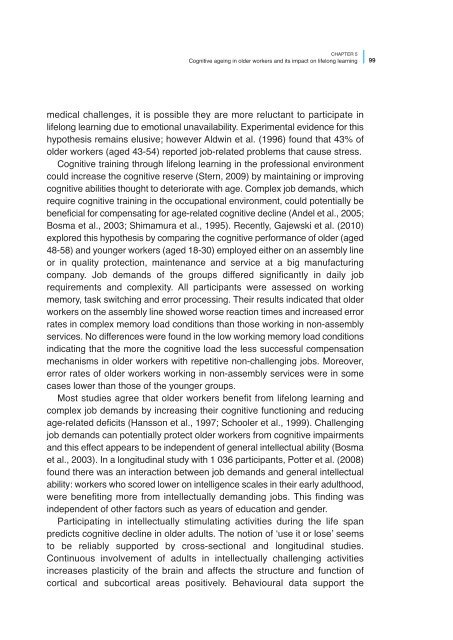Working and ageing - Cedefop - Europa
Working and ageing - Cedefop - Europa
Working and ageing - Cedefop - Europa
You also want an ePaper? Increase the reach of your titles
YUMPU automatically turns print PDFs into web optimized ePapers that Google loves.
CHAPTER 5<br />
Cognitive <strong>ageing</strong> in older workers <strong>and</strong> its impact on lifelong learning 99<br />
medical challenges, it is possible they are more reluctant to participate in<br />
lifelong learning due to emotional unavailability. Experimental evidence for this<br />
hypothesis remains elusive; however Aldwin et al. (1996) found that 43% of<br />
older workers (aged 43-54) reported job-related problems that cause stress.<br />
Cognitive training through lifelong learning in the professional environment<br />
could increase the cognitive reserve (Stern, 2009) by maintaining or improving<br />
cognitive abilities thought to deteriorate with age. Complex job dem<strong>and</strong>s, which<br />
require cognitive training in the occupational environment, could potentially be<br />
beneficial for compensating for age-related cognitive decline (Andel et al., 2005;<br />
Bosma et al., 2003; Shimamura et al., 1995). Recently, Gajewski et al. (2010)<br />
explored this hypothesis by comparing the cognitive performance of older (aged<br />
48-58) <strong>and</strong> younger workers (aged 18-30) employed either on an assembly line<br />
or in quality protection, maintenance <strong>and</strong> service at a big manufacturing<br />
company. Job dem<strong>and</strong>s of the groups differed significantly in daily job<br />
requirements <strong>and</strong> complexity. All participants were assessed on working<br />
memory, task switching <strong>and</strong> error processing. Their results indicated that older<br />
workers on the assembly line showed worse reaction times <strong>and</strong> increased error<br />
rates in complex memory load conditions than those working in non-assembly<br />
services. No differences were found in the low working memory load conditions<br />
indicating that the more the cognitive load the less successful compensation<br />
mechanisms in older workers with repetitive non-challenging jobs. Moreover,<br />
error rates of older workers working in non-assembly services were in some<br />
cases lower than those of the younger groups.<br />
Most studies agree that older workers benefit from lifelong learning <strong>and</strong><br />
complex job dem<strong>and</strong>s by increasing their cognitive functioning <strong>and</strong> reducing<br />
age-related deficits (Hansson et al., 1997; Schooler et al., 1999). Challenging<br />
job dem<strong>and</strong>s can potentially protect older workers from cognitive impairments<br />
<strong>and</strong> this effect appears to be independent of general intellectual ability (Bosma<br />
et al., 2003). In a longitudinal study with 1 036 participants, Potter et al. (2008)<br />
found there was an interaction between job dem<strong>and</strong>s <strong>and</strong> general intellectual<br />
ability: workers who scored lower on intelligence scales in their early adulthood,<br />
were benefiting more from intellectually dem<strong>and</strong>ing jobs. This finding was<br />
independent of other factors such as years of education <strong>and</strong> gender.<br />
Participating in intellectually stimulating activities during the life span<br />
predicts cognitive decline in older adults. The notion of ʻuse it or loseʼ seems<br />
to be reliably supported by cross-sectional <strong>and</strong> longitudinal studies.<br />
Continuous involvement of adults in intellectually challenging activities<br />
increases plasticity of the brain <strong>and</strong> affects the structure <strong>and</strong> function of<br />
cortical <strong>and</strong> subcortical areas positively. Behavioural data support the

















